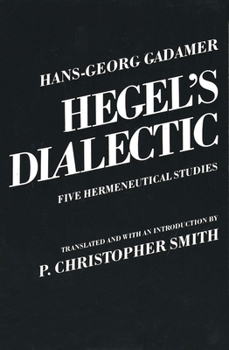Hegel's Dialectic: Five Hermeneutical Studies
Select Format
Select Condition 
Book Overview
These five essays on Hegel give the English-speaking reader a long-awaited opportunity to read the work of one of Germany's most distinguished philosophers, Hans-Georg Gadamer. Gadamer's unique... This description may be from another edition of this product.
Format:Paperback
Language:English
ISBN:0300028423
ISBN13:9780300028423
Release Date:September 1982
Publisher:Yale University Press
Length:128 Pages
Weight:0.46 lbs.
Dimensions:0.4" x 5.5" x 8.2"
Customer Reviews
2 ratings
Short and Sweet
Published by Thriftbooks.com User , 16 years ago
5, concise and insightful essays. A great primer for Hegel's thought, the author's hermeneutic method proves itself over and again throughout. Highly recommended.
The young Hegelians
Published by Thriftbooks.com User , 24 years ago
Concerning the rational structure of the Absolute, Hegel, following the ancient Greek philosopher Parmenides, argued that "what is rational is real and what is real is rational." This must be understood in terms of Hegel's further claim that the Absolute must ultimately be regarded as pure Thought, or Spirit, or Mind, in the process of self-development. The logic that governs this developmental process is dialectic. The dialectical method involves the notion that movement, or process, or progress, is the result of the conflict of opposites. Traditionally, this dimension of Hegel's thought has been analyzed in terms of the categories of thesis, antithesis, and synthesis. Although Hegel tended to avoid these terms, they are helpful in understanding his concept of the dialectic. The thesis, then, might be an idea or a historical movement. Such an idea or movement contains within itself incompleteness that gives rise to opposition, or an antithesis, a conflicting idea or movement. As a result of the conflict a third point of view arises, a synthesis, which overcomes the conflict by reconciling at a higher level the truth contained in both the thesis and antithesis. This synthesis becomes a new thesis that generates another antithesis, giving rise to a new synthesis, and in such a fashion the process of intellectual or historical development is continually generated. Hegel thought that Absolute Spirit itself (which is to say, the sum total of reality) develops in this dialectical fashion toward an ultimate end or goal. For Hegel, therefore, reality is understood as the Absolute unfolding dialectically in a process of self-development. As the Absolute undergoes this development, it manifests itself both in nature and in human history. Nature is Absolute Thought or Being objectifying itself in material form. Finite minds and human history are the process of the Absolute manifesting itself in that which is most kin to itself, namely, spirit or consciousness. In The Phenomenology of Mind Hegel traced the stages of this manifestation from the simplest level of consciousness, through self-consciousness, to the advent of reason.






